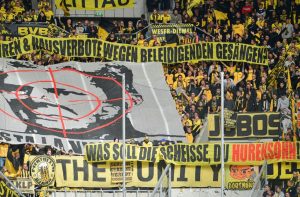Ultras, Protest und Tradition: sind die Rechte der Fußballfans in Deutschland gedroht? Ein Rückblick in Fußball und Gesellschaft in Prä-Pandemie Deutschland
Nachdem ich einen Artikel über Ultras in der Pandemiezeit im Heft ‚11 Freunde‘ gelesen habe, war ich interessiert zu sehen, wie Ultras in den Medien dargestellt werden. Dieses Schreiben ist das Ergebnis davon!
Seit langer Zeit ist Deutschland ein renommiertes Ziel für die Fußballfanerfahrung, dank der großartigen Fußballfanszene und Vielfalt an Fankulturen. Viele der in Großbritannien wohnenden Fans, die sich nach einer ‚purer‘ Version des schönen Spiels fahren nach Deutschland allein aus diesem Grund. Fußball in Deutschland bietet oft das, was in Großbritannien fehlt: lebendige Stimmungen, Bier auf der Tribüne und Stehplätze. Diese Faktoren spielen alle eine wichtige Rolle dabei, Leute aus allen Hintergründen und sozialen Schichten anzulocken. Eng verbunden mit der Komplexität und der reichen Vielfalt in der deutschen Fußballszene sind die Ultras, Gruppen von treuen Fans, die leidenschaftlich ihre Mannschaft unterstützen. Für die Ultras, ist diese Unterstützung eine Lebensweise. Diese Stärkung äußert sich als Fanmarsche, Tifos, der Gebrauch von Bengalos und die Erstellung kluger und origineller Banners, die alles unter Unterstützungs-, Stolz- oder Abneigungs-Nachrichten schildern.
Diese Fangruppen waren in letzter Zeit in Deutschland und in der gesamten Sportwelt im Fokus, weil sie beharrlich und weitverbreitet gegen Dietmar Hopp, den milliardenschweren Mitbegründer des Softwareunternehmens SAP, protestierten. Diese Proteste wurden überwiegend kritisch bewertet. Hopp hat als erfolgreicher Unternehmer viel Gutes für seine Region getan und große Summen in Medizin, Bildung und karitative Zwecke investiert. Auch den Aufstieg seines Dorfvereins Hoffenheim aus den Tiefen des deutschen Fußballs bis in die Bundesliga hat er finanziert. Damit ist Hopp quasi zur Verkörperung eines Kernthemas geworden, gegen das sich die Ultras positionieren: die Modernisierung und Kommerzialisierung des Fußballs. Hoffenheim ist eine von drei Ausnahmen von der 50+1-Regel in Deutschland, bei der die Fans die Mehrheit an einem Verein besitzen. Weil Hopp mindestens 20 Jahre lang ununterbrochen in den Verein investiert hat, wurde ihm die Gesamtmehrheit zugesprochen. Dieser Schritt an sich war äußerst problematisch und droht immer noch, die 50+1-Struktur zu untergraben, die die Meinung der Fans und den fangeführten Fußball in Deutschland so hervorragend schützt.
In letzter Zeit protestierten die Ultras zahlreicher Vereine gegen ein DFB-Urteil von Ende Februar, das ein kollektives Verbot der Fans von Borussia Dortmund für die nächsten zwei Spielzeiten in Hoffenheim vorsah. Das Urteil kam zustande, nachdem Dortmunder Fans immer wieder Spruchbänder mit Kritik an Hopp gezeigt hatten, obwohl der DFB-Präsident 2017 vers ichert hatte, ein kollektives Verbot von Fans sei ausgeschlossen. Diese Entscheidung bedroht die Fähigkeit der Ultras und Fans im Allgemeinen, sich mit ihren Transparenten zu gesellschaftlichen Themen zu äußern: Ihre Meinung wird zensiert. Besonders unversöhnlich reagiert eine Reihe von Ultra-Gruppen, die Transparente von Fans aus Augsburg, Bayern München, Borussia Dortmund und Darmstadt – um nur einigen zu nennen – entrollt haben.
ichert hatte, ein kollektives Verbot von Fans sei ausgeschlossen. Diese Entscheidung bedroht die Fähigkeit der Ultras und Fans im Allgemeinen, sich mit ihren Transparenten zu gesellschaftlichen Themen zu äußern: Ihre Meinung wird zensiert. Besonders unversöhnlich reagiert eine Reihe von Ultra-Gruppen, die Transparente von Fans aus Augsburg, Bayern München, Borussia Dortmund und Darmstadt – um nur einigen zu nennen – entrollt haben.
Beim Spiel zwischen Hoffenheim und Bayern München an diesem Wochenende kam es zu bizarren Szenen, als der Schiedsrichter das Spiel vorübergehend abbrach. Grund dafür war, dass Bayern-Fans ein beleidigendes Transparent mit der Aufschrift “Du Hurensohn” in Richtung Hopp entrollt hatten. Als die Spieler wieder auf das Spielfeld kamen, sahen sie sich die letzten 13 Minuten des Spiels an, indem sie es untereinander austauschten. Anschließend gingen beide Spieler gemeinsam mit Hopp und dem Bayern-Vorstand auf das Spielfeld und applaudierten den Hoffenheimer Fans aus Solidarität.
Klar, ist die Verwendung des Begriffs Hurensohn problematisch. Trotz der Tatsache, dass er regelmäßig in Liedern erwähnt wird, ist er inhärent aggressiv und hat mehr von einer negativen Konnotation gegenüber Hopps Mutter. Die Ultras von Eintracht Frankfurt konterten später diese verfehlte Wortwahl, indem sie in ihrem Protestbanner die Formulierung ‚du Sohn einer Mutter‘ verwendeten. Auch andernorts geriet Hopp bei Protesten ins Fadenkreuz einer Pistole, was von denjenigen, die sie benutzten, sicherlich besser hätte beurteilt werden können. Ziemlich einleuchtend erklärten die Union Berlin-Ultras “Hammer Hearts 04” die Verwendung des Motivs als Darstellung der “freien Meinung im Fadenkreuz”. Offensichtlich fühlen sich diese Ultras an den Punkt gedrängt, an dem ihre Meinungsfreiheit derart bedroht ist, dass sie eine Aktion wie diese als einzig angemessene Antwort betrachten. Diese Aussage rechtfertigt jedoch nicht wirklich die Verwendung des Fadenkreuzes.
Deshalb ist es extrem wichtig, dass der Diskurs zu diesem Thema die Proteste gegen Hopp in den größeren zeitlichen Rahmen der Ereignisse im deutschen Fußball einordnet. Wir müssen uns fragen: Warum hat der DFB die rassistischen Beleidigungen gegen Jordan Torunarigha von Hertha Berlin im vergangenen Monat nicht verurteilt? Warum gab es damals keine Spielunterbrechung, und warum hatten die Spieler keine Lust, sich mit einem rassistisch beschimpften Spieler zu solidarisieren? Es besteht kein Zweifel daran, dass die Ultras vieler Vereine die Grenze überschritten haben, indem sie Hopp ins Fadenkreuz einer Waffe stellten. Obwohl dies die Aufmerksamkeit auf das Thema lenkte, hätte es bessere Wege geben können, die Missstände der Ultras zu vermitteln. Es mutet jedoch etwas ironisch an, dass der DFB weiterhin gegen Ultras wegen ihrer Proteste gegen die Kommerzialisierung des Fußballs vorgeht, während er gegen aktive Manifestationen von Rassismus scheinbar nicht vorgeht. Vielleicht hat die enge Verbindung zwischen Hopps Firma SAP und dem DFB als “Premiumpartner” etwas mit dieser extremen Reaktion der Fußballbehörden zu tun.
Während Ultras in den sogennanten ‚Mainstream-Medien‘ oft negativ dargestellt und vom DFB mit harten Strafen für ihre Aktionen belegt werden, spielen viele Gruppen auch eine viel differenziertere und positivere Rolle in ihren lokalen Gemeinschaften. Die Bayern-Ultras, insbesondere die Gruppe Schickeria, haben durch ihre Aktionen eine wichtige Rolle im Kampf gegen Homophobie, Antisemitismus und Rassismus gespielt. In ihren Darbietungen haben sie wiederholt ihre Unterstützung für die Rechte von Flüchtlingen, das Gedenken an den Holocaust und NGOs, die Migranten aus dem Meer retten, gezeigt. Während der Pandemie haben die auch Essensbuden geholfen und sind als wichtige Mitglieder ihrer Gemeinschaft zu betrachten. Obwohl es problematisch wäre zu behaupten, dass die Ultras und ihre leidenschaftliche Unterstützung es nie zu weit treiben, und es falsch wäre, ihre Aktionen auf der Grundlage ihrer politischen Positionierung zu entschuldigen, ist es wichtig, diese einzelnen Gruppen in einem größeren Zusammenhang zu betrachten und nicht im Kontext der engen und meist negativen Bilder, die in den ‚Mainstream-Medien‘ dargestellt werden. Auf diese Weise ist es möglich, die ursächlichen Faktoren hinter den Aktionen vieler Ultras in ihrem Protest gegen die Kommerzialisierung des Fußballs richtig zu verstehen. Dies bedeutet nicht, dass die Aktionen der Ultras in keiner Weise problematisch sind, sondern unterstreicht vielmehr die Notwendigkeit eines nuancierteren Verständnisses ihrer Rolle innerhalb des deutschen Fußballs, sowie ihres Kampfes gegen die Modernisierung und Kommerzialisierung des Spiels. Es wird interessant sein zu sehen, wie sich die Situation von diesem Punkt aus entwickeln wird – sind die Rechte und Stimmen der Fußballfans in Deutschland bedroht?
EN: Ultras, protest and tradition: are the rights of football fans in Germany under threat? A look back at football and society in pre-pandemic Germany
After I read an article on ultras during the pandemic in the magazine ’11 Freunde’, I was interested to see how ultras are portrayed in the media. This piece is the result of that!
Germany has long been a destination renowned for its impressive football fan experience, thanks largely to its fantastic football scene and rich variety of fan cultures. Many UK-based football fans seeking a ‘purer’ version of the beautiful game will head to Germany for this reason alone. Football in Germany offers many things which are only recognisable to fans of a certain generation in the UK, with lively atmospheres, beer on the terraces and safe standing. These factors all help to play a key role in attracting people from many diverse backgrounds and walks of life. Intrinsically linked to the complexity and rich variety within the German football scene are the ultras, groups of staunch supporters who actively and passionately back their side no matter what. For ultras, supporting their team is not a choice, but rather a way of life. This support manifests itself in the form of fan marches, choreographed displays, the use of flares and the creation of clever and original banners conveying everything from messages of support, pride or distaste.
These fan groups have been a central talking point in Germany and across the sporting world recently due to their sustained and widespread protests against Dietmar Hopp, the billionaire co-founder of software company SAP, and the largely critical reaction to these protests. As a successful entrepreneur, Hopp has done a lot of good for his local region, investing large sums in medicine, education and charitable causes. He also bankrolled the rise of his local village side Hoffenheim from the depths of German football up to the top division, the Bundesliga. In doing so, Hopp has essentially become the embodiment of key issues which the ultras position themselves against: the modernisation and commercialisation of football. Hoffenheim is one of three exceptions to the 50+1 rule in Germany, whereby fans own the majority of a club. Because Hopp continuously invested in the club for at least 20 years, he was ruled as fit to own an overall majority. This move in itself was extremely problematic and still threatens to undermine the 50+1 structure, which so brilliantly protects fans’ opinions and fan-led football in Germany.
In the last bit of time, protests were staged by the ultras of numerous clubs in response to a DFB ruling in late February which saw Borussia Dortmund fans collectively banned from supporting their club in Hoffenheim for the next two seasons. This ruling transpired after Dortmund fans consistently produced banners criticising Hopp and came despite previous assurances from the DFB’s president in 2017 which ruled out a collective ban of supporters. This threatens the ability of the ultras and fans in general to comment on societal issues in their displays: their opinions are being censored. The united response from a number of ultra groups has been particularly unforgiving, with banners unfurled by fans of Augsburg, Bayern Munich, Borussia Dortmund and Darmstadt – to name just a few.
At the match between Hoffenheim and Bayern Munich on the aforementioned weekend, there were bizarre scenes as the referee temporarily postponed the game. This was due to Bayern fans unveiling an insulting banner aimed at Hopp, containing the message du Hurensohn, or ‘you son of a whore’. When the players came back out onto the pitch, they saw out the last 13 minutes of the game passing it amongst themselves. Afterwards, both sets of players joined Hopp and the Bayern chief executive on the pitch to applaud the Hoffenheim fans in a show of solidarity.
Granted, the use of the term Hurensohn is problematic. Despite the fact that it is routinely mentioned in songs, it is inherently aggressive in nature and if anything has negative connotations towards Hopp’s mother. Eintracht Frankfurt ultras later countered this misjudged word choice by using the phrase du Sohn einer Mutter in their protest banner – you son of a mother. Protests elsewhere also placed Hopp within the crosshairs of a gun, a move which certainly could have been judged better by those who used it. In rather lucid terms, Union Berlin ultras ‘Hammer Hearts 04’ explained the use of the motif as a representation of “free opinion in the crosshairs”. Clearly, these ultras feel pushed to the point at which their freedom of expression is threatened in such a way that they deem an action like this as the only appropriate response. This statement doesn’t really justify the use of the crosshairs, however.
It is therefore vital that the discourse on this issue positions the protests against Hopp within the wider timeline of events in German football. We must ask ourselves, why did the DFB fail to condemn the racist slurs directed at Hertha Berlin’s Jordan Torunarigha last year? Why was there no stoppage in play then, and why did the players not feel like having a kick about in solidarity with a player who had been racially abused? There is no doubting that the ultras of many clubs did overstep the line by placing Hopp in the crosshairs of a gun. Although this drew attention to the issue, there could have been better ways to convey the ultra’s grievances. However, it seems somewhat ironic that the DFB continues to crack down on ultras for their protests against the commercialisation of football, whilst seemingly failing to deal with active manifestations of racism. Perhaps the close link between Hopp’s company SAP and the DFB as a ‘premium partner’ may have something to do with this extreme reaction on the part of the footballing authorities.
Whilst ultras are often portrayed negatively in the mainstream media and handed heavy punishments for their actions by the DFB, many groups also play a much more nuanced and positive role in their local communities. Bayern’s ultras, specifically the group Schickeria, have been an important force in fighting homophobia, anti-Semitism and racism through their actions. In their displays, they have repeatedly showed support for refugee rights, holocaust remembrance and NGOs rescuing migrants at sea. During the pandemic they have also helped with food banks and shown themselves as important members of the community. Although it would be problematic to claim that the ultras and their passionate support never take it too far, and wrong to excuse their actions on the basis of their political positioning, it is important to view these individual groups in a more coherent manner, rather than in the context of the narrow and mostly-negative images portrayed in the mainstream media. In doing so, it is possible to properly understand the causal factors behind the actions of many ultras in their protest against the commercialisation of football. This does not mean that the ultras’ actions are in no way problematic, but rather highlights a need for a more nuanced understanding of their role within German football, as well as their fight against the modernisation and commercialisation of the game. It will be interesting to see how the situation will develop from this point – are the rights and voices of football supporters in Germany under threat?
